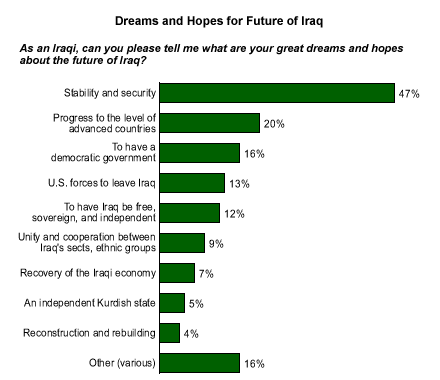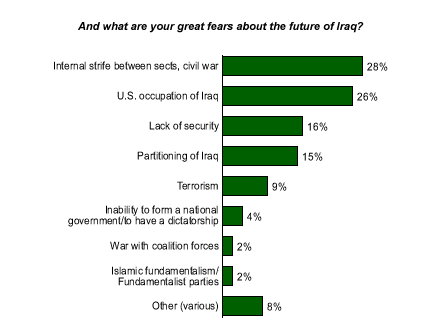"Clearly, the security situation trumps everything. Having a school that is renovated does you no good if you are afraid to send your kids there because you are afraid they are going to die on the way."
On Monday, the Coalition Provisional Authority returned "formal sovereignty" to an interim, appointed Iraqi government headed by Prime Minister Iyad Allawi. In a simple, brief ceremony, L. Paul Bremer handed a legal document to Iraqi chief justice Medhat Mahmud shortly before 10:30 a.m. local time and read a brief statement, which concluded with the words, "Sincerely, Paul Bremer, ex-administrator." The surprise timing of the event -- two days ahead of the scheduled handover date of June 30 -- was widely viewed as an effort to preempt attacks aimed at disrupting the transfer of power.
What aspirations do Iraq's citizens have for their country's future? Although they clearly want self-determination and independence, results from the 2004 Gallup Poll of Iraq indicate that Iraqis' immediate desire -- mentioned more frequently than any other -- is simply the establishment of security and stability within their country. This is understandable, because in the absence of stability, no broader national progress or achievement is possible.
Hopes, Dreams, and Fears
When Gallup asked Iraqis to articulate their hopes for the future, a basic desire for security easily topped the list of replies.
Nearly half (47%) of the 3,444 Iraqis interviewed volunteered a desire for stability and security as their greatest dream. This percentage is significantly larger than the 20% who hope that the country will develop to a standard equivalent of that in other advanced countries, or the 16% who wish for a democratic form of government.
Somewhat smaller percentages of Iraqis referred to their desire for coalition forces to leave Iraq (13%), for the country to be free, sovereign, and independent (12%), and for the future to be one of unity and cooperation between the country's sectarian and ethnic groups (9%).

Similarly, when Iraqis were asked to name their greatest fear for their country's future, references to sectarian strife and the possibility of civil war loomed (28%), along with concern that the coalition's occupation may continue (26%).
In addition to the concern expressed about possible internal sectarian conflict, 16% of respondents fear that the country's lack of security will not abate, while 15% voiced the apprehension that the country will be partitioned, and 9% said they fear continued internal terrorism.
Finally, in a finding that helps to place the breadth and depth of these security concerns in perspective, just 4% of Iraqis voice any specific fear relating to the country's future political system (for example, the inability to form a national government, or the possible return of dictatorship).

In Their Own Words
Gallup groups and quantifies the responses to these open-ended questions to attain an accurate measure of the prevalence of various sentiments. However, the most vivid testimony comes from the actual responses:
What are your great dreams and hopes about the future of Iraq?
- "To provide security, stability, and comfortable living,
equality, with no discrimination between ethnic nationalities or
religions" -- female, 45-49, elementary education, housewife,
Baghdad
- "For Iraq to be free from occupation and enjoy security and
peace" -- male, 35-39, university graduate, employed
- "A flourishing Iraq -- God willing" -- female, 20-24,
intermediate education, housewife, Basra
- "Prosperity and reconstruction -- like other nations" -- male,
30-34, elementary education, self-employed, Baghdad
- "The independence of the Kurds, the formation of a Kurdish
state, and the stability of Iraq" -- female, 30-34, high school
diploma, employed, Sulaymaniyah
- "To be the Switzerland of the Middle East -- and to protect its
religion, its culture, and its Islamic identity" -- male, 50-54,
university graduate, employed, Salah ad Din
- "To be a symbol of democracy and capable of defending itself"
-- male, 25-29, high school diploma, unemployed, al Anbar
- "One stable and safe Iraq, with its people enjoying more
economic prosperity" -- male, 40-44, university education, al
Anbar
- "A federal Iraq" -- male, 60+, illiterate, self-employed,
Sulaymaniyah
- "Every citizen to acquire her or his own rights" -- female,
40-44, illiterate, housewife
- "To have a good job and that Americans depart from Iraq" --
male, 20-24, self-employed, Baghdad
- "Agreement between sects and religions over an honest national
government and a permanent rule of law" -- male, 30-40, Wasit
- "Freedom and democracy and adherence to the Islamic law" --
male, 25-30, Najaf
- "Having my own home for my children and myself; be independent
in it; find a job for my husband; and immediate departure of the
Americans" -- female, 35-39, Sadr City, Baghdad
- "To live in prosperity and people be given the oil resources" -- male, 30-34, Baghdad
And what are your greatest fears about the future of Iraq?
- "Civil war and sectarian strife" -- male, 20-24, elementary
education, unemployed, Baghdad
- "Not handing over authority to an elected and sovereign Iraqi
government" -- male, 25-29, intermediate education, employed,
Baghdad
- "I fear that Iraq will become like Palestine" -- female, 25-29,
elementary education, housewife, Baghdad
- "The emergence of several sects, partitioning, and the
implementation of privatization" -- male, 30-34, secondary
education, self-employed, Baghdad
- "A dark future and an unknown fate" -- male, 18-19,
intermediate education, al Anbar
- "Lack of security, and disintegration and partitioning of the
country; squandering the wealth and resources of the Iraq and not
giving them to its people" -- male, 40-44, university education, al
Anbar
- "Wasting Iraq's wealth for the benefit of those other than
Iraqis" -- male, 35-39, elementary education, self-employed,
Najaf
- "Civil war, and the interference of neighboring countries" --
male, 60+, illiterate, self-employed, Sulaymaniyah
- "Iraq remaining under occupation for a long period of time" --
female, 40-44, illiterate, housewife
- "Partition and religious fundamentalism" -- female, 35-39,
secondary education, housewife, Diyala
- "A continued lack of security, more explosions, no
reconstruction, and no services" -- male, 30-34, elementary
education, employed
- "The persistence of terrorism which we do not know where it is
coming from" -- female, 55-59, elementary education, housewife
- "Interference in our internal affairs, continued occupation and
partition" -- male, 30-34, elementary education, farmer
- "Partition, sectarianism, and the return of dictatorship" --
male, 18-19, intermediate education, farmer, Babil
- "Terrorism and fundamentalist Islam" -- male, 60+, elementary
education, farmer, Sulaymaniyah
- "That democracy will be (just) a dream" -- male, 45-49, al
Qadisiyah
- "A fundamentalist Islamist political regime" -- male, 30-35,
Sulaymaniyah
- "Theft of Iraq's resources" -- male, 25-29, al Anbar
